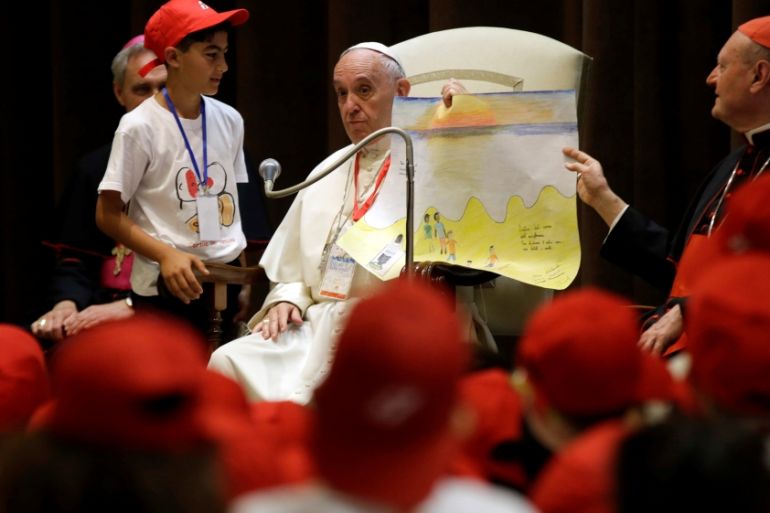Pope Francis: Refugees not dangerous, but in danger
Pope Francis underscores plight of young refugees at meeting with hundreds of children at the Vatican.

Pope Francis has held an emotional meeting with hundreds of children at the Vatican, including a Nigerian boy whose parents had drowned, and said that refugees “are not dangerous, but in danger”.
The meeting on Saturday followed a surge in refugee traffic this week between Libya and Italy, with more than 14,000 saved from overcrowded boats since Monday and three consecutive days of shipwrecks in which hundreds may have died.
Keep reading
list of 4 itemsMuslim pupil loses UK court bid over Michaela school prayer rituals ban
Photos: Sikhs celebrate harvest festival of Baisakhi, marking new year
Masses gather for Eid celebrations in India
Three infants were among 45 bodies recovered at sea on Friday, UNICEF Italy said.
Meeting the mostly Italian children, who took a special train from southern Italy to the Vatican’s own railway station, Francis hugged the Nigerian boy, Osayande, who has been taken in by an Italian family.
![Pope Francis shows the children an orange life jacket given to him by a Spanish rescuer working to save lives in the Mediterranean [Reuters]](/wp-content/uploads/2016/05/2f61af3bba2842869405be5d4a928acd_18.jpeg)
He showed the gathering an orange life jacket he was given by a Spanish rescuer working to save lives in the Mediterranean.
“He brought me this life jacket and, crying a little bit, he said: ‘Father, I failed. There was a little girl in the sea and I wasn’t able to save her. All I could reach was her life jacket’,” the pope said.
“What was her name? I don’t know – a little girl without a name … She’s in heaven and watching us. Let’s close our eyes, think about her and give her a name,” the pope added.
READ MORE: Italy plans a cemetery for refugees drowned at sea
The Italian coastguard and navy ships, aided by Irish and German vessels as well as humanitarian organisations, saved 668 migrants and refugees from smugglers’ boats in distress in the Mediterranean Sea off Libya on Saturday, officials from Italy and Ireland said.
The rescues were the latest by the multinational patrol south of Sicily that has saved thousands this week.
The Irish military said the vessel Le Roisin, deployed earlier this month in the humanitarian search-and-rescue mission, saved 123 migrants and refugees from a 12-metre rubber dinghy and recovered a dead man.
A German ship, part of the EUNAVFOR MED deployment on patrol for smugglers’ boats, was also involved in four separate rescue operations, the Italian coastguard said in a statement early on Saturday evening.
Meanwhile, with migrant and refugee shelters filling up in Sicily, the Italian navy vessel Vega headed towards Reggio Calabria, a southern Italian mainland port, bringing 135 survivors, along with 45 bodies, from a rescue a day earlier. The Vega was due to dock on Sunday.
Under a European Union deal, tens of thousands of those rescued at sea and seeking asylum were supposed to be relocated to other EU nations from Italy and Greece, whose shores have received most of the migrants and refugees in recent years.
But with resentment building in some European countries about taking in refugees, the plan never really took off, and only a small percentage of those slated for relocation have actually been moved.
The pope has repeatedly sought to underscore the plight of these people, especially the hundreds of thousands who have risked their lives to come to Europe in flimsy boats.
He visited the Greek island of Lesbos last month, bringing 12 refugees back on his plane to set an example of how other people and countries should welcome refugees.
“The number of minors who make the journey on their own and arrive in Europe is much higher than what we saw last year,” Save the Children spokeswoman Giovanna Di Benedetto said.
“But we are increasingly coming across much younger children, children of nine or ten years of age, who have made the journey alone or who have lost their parents or family members with whom they were travelling,” she said.